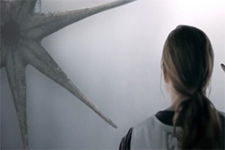Arrival
|  The title of Denis Villeneuve’s Arrival, which is based on the award-winning novella “Story of Your Life” by Ted Chiang, carries a crucial double meaning that is central to the film’s underlying thesis about the sanctity of life (the lack of a definite article before the title is our first cue to its multiple significances). The conventional and most obvious meaning of the title refers to the arrival of 12 alien spacecraft, which hover over various, seemingly random locations around the Earth for unknown reasons. Yet, a secondary and—I would argue—much more important meaning refers to the arrival of the daughter of the film’s protagonist, Dr. Louise Banks (Amy Adams), a linguist who is brought in by the military to try to communication with the extra-terrestrials. The film’s opening scene depicts not the arrival of the spacecraft, but the arrival of Louise’s daughter, which Villeneuve, whose previous films have centered primarily around paranoia, violence, and cruelty, depicts with a poetic grace worthy of Terrence Malick. It begins the story on a note of beauty, connection, and humanity, but also tragedy, as we soon see that her daughter develops a rare form of childhood cancer that takes her from Louise early in life. Thus, within the first 10 minutes, the film has already taken us through a gamut of emotional registers, conveying in simple, but not simplistic, terms the vastness of human experience—from absolute bliss, to utter devastation. It is within that context that we see the alien spacecraft arrive, which Louise, like millions of others, witnesses on television in her university classroom as her students begin receiving notices on their smartphones. Villeneuve and cinematographer Bradford Young (A Most Violent Year, Selma) depict the spacecraft with riveting visuals of great power and mystic beauty, especially a wide tracking shot into one that is hovering over a field in Montana, flanked on one side by low-lying clouds that are being drawn toward it, which creates a dreamlike aura that feels inseparable from the hypnotic score by regular Villeneuve collaborator Jóhann Jóhannsson. Louise is soon approached by Colonel Weber (Forest Whitaker), who wants her to go with him to the spacecraft in Montana. She is joined by Ian Donnelly (Jeremy Renner), a theoretical physicist, and together they ascend into the belly of the ship (which looks like a giant computer mouse standing on end), which opens for a brief period every 18 hours. Inside, they are confronted by the ship’s inhabitants, two seven-limbed aliens whom they dub Abbott and Costello. They communicate in an enormous empty room, separated by a huge pane of what appears to be frosted glass, which keeps the aliens slightly hazy and mysterious. Louise learns that they communicate in written form using a series of complex circular designs, which she sets about trying to decipher after determining that there is no way for them to communicate orally. Louise is eventually able to figure out their language, at least in a rudimentary form, and determines that the aliens want to give something to humanity. However, there is disagreement in translating their intentions, as some experts interpret their words to mean “weapon” and hence forthcoming violence, while Louise suspects that a better translation would be “tool,” meaning that they somehow want to help humanity. As we have seen in so many science fiction films, the fundamental distrust of anything alien to our world colors our perceptions, as does the heavy military presence. Soon, there is an imminent threat that the various militaries around the world, especially China’s, will engage in war against the spacecraft, while Louise and Ian try desperately to convince them otherwise—a messy endeavor given that she cannot be absolutely sure of her own understanding of the alien language. Obviously, there are all kinds of real-world political and social metaphors at work here. Language is the definer of human relationships; it can bring us together or erect barriers to understanding. Words are concrete, but meaning is intangible, often subject to change and always subject to misunderstanding. So much of the violence in the world, which Villeneuve has explored in his previous films, particularly Prisoners (2012), a drama about a father going to brutal extremes to find his missing daughter, and Sicario (2015), a thriller about the cross-border drug trade, arises from misunderstanding, willful or otherwise, and its threat hangs heavy over Arrival, giving it an intense edge. Screenwriter Eric Heisserer, whose previous work has been mostly shoddy horror remakes like A Nightmare on Elm Street (2010) and The Thing (2011), shows a gift for both patience and empathy, trusting that the viewer will become immersed in the psychological depth of his characters and forgo expectations of constant spectacular display and frivolous excitement. Yet, in the end, the film is not really about the aliens or their language or even the relationship between them and the humans who are trying to communicate with them. (Spoiler alert! If you have not seen the film yet and do not want to know what happens, abandon this review now!) As it turns out, Louise’s growing ability to understand the alien language begins to affect her understanding and experience of time. The “tool” that the aliens want to bestow on humanity is nothing less than their language and the manner in which it allows its users to experience time nonchronologically. And, because we have been aligned with Louise (who is beautifully, powerfully played by Adams), we begin to have the same kind of realization as we recognize that what we thought was a linear narrative is, in fact, anything but. The opening sequence depicting the birth, short life, and untimely death of Louise’s daughter, which we assumed to have taken place before the arrival of the aliens, is actually a future event, something that has yet to happen. The brief scenes scattered throughout the film depicting her daughter are thus not flashbacks, but flashforwards. Louise’s ability to see into her future becomes crucial to salvaging the human-alien relations, as she experiences a future event involving the prime minister of China thanking her at a reception for convincing him to not attack the spacecraft. This reversal of our understanding of the film’s chronology is not just a narrative gimmick, but a radical means of forcing us to acknowledge the monumental nature of the choices we make every day (in this regard, it takes its place alongside Christopher Nolan’s Memento and Michel Gondry’s Eternal Sunshine of the Spotless Mind as a film that transcends a time-related narrative gimmick with genuine philosophical introspection). When we understand that Louise has not lost a daughter, but rather will lose a daughter, our understanding of her character shifts completely and we have to go back and re-interpret scenes that we thought were contextualized by a loss that actually has not yet happened. Even more importantly, the film ends on a moment when Louise has the choice of whether to see that future through, knowing all that it will entail. Her decision to do precisely that—to take on the loss and the heartbreak and the devastation because of all the joy, love, and life that goes with it—is a powerful, emotionally stirring evocation of the sanctity of all human life, however long or short. At a time when life has become a political football—whether it be war or capital punishment or euthanasia or abortion—Arrival celebrates with poignant clarity the decision to embrace it in all its wonderful messiness without ever feeling smug or sanctimonious about its morality (which is what separates it from all the explicitly Christian films that would aim to do the same thing, but alienate the very viewers they’re trying to reach). It is a powerful, deeply felt, wonderfully evocative film that will rightly takes its place on the mantle of great science fiction.
Copyright © 2017 James Kendrick Thoughts? E-mail James Kendrick All images copyright © Paramount Home Entertainment | |||||||||||||||||||||||||||||||||||
Overall Rating: 


 (4)
(4)


